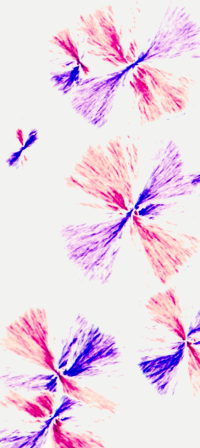| | Flyer Poster |
Many properties of macromolecular and soft matter materials depend on molecular order/disorder on various length scales. For instance, order may be beneficial for enhanced mechanical properties, while disorder may allow for high ductility. Consequently, it is reasonable to expect that optoelectronic properties and charge transport in conducting soft materials, e.g. conjugated polymers, are also strongly affected by morphological aspects (conformational degrees of freedom, molecular order, lamellar orientation, domain size, …).
For example, conjugated polymers, in particular when they are semi-crystalline, exhibit various structural features on hierarchical length scales. Quantum mechanical phenomena and charge transport depend not only on the chemical structure of the monomers, but also on the local molecular packing and the corresponding (delocalized) electronic states. Spatial ordering and morphology of conjugated polymers can be strongly influenced and even controlled via processing stages, often resulting in hierarchically structured systems. The charge transport across boundaries between various structural building blocks and the possibility of trapping at local defects will have significant impact on macroscopically (averaged) measured transport and the overall performance of the material.
Therefore, this summer school wants to explore correlations between structure and electronic properties for soft matter materials used in the field of organic electronics.
Main objectives of the SoMaS Summer Schools:
- Introducing young researchers (PhD students, PostDocs, MSc students) through interdisciplinary lectures to the field of soft matter science
- Integrating young researchers in the scientific community of soft matter and initiate cooperation between the participants
- Providing information on the different career opportunities after a PhD in soft matter science
To this end the SoMaS Summer Schools deploy the following tools: - Basic knowledge is provided through a series of introductory courses.
- The field of each course will be complemented and illustrated by research seminars and intensive discussion in tutorials.
- In order to boost scientific exchange, all participants shall present their results and, most importantly, their questions and strategies in the form of posters.
- Several sessions on career prospects will complete the school.
PhD and master students can obtain 3 ECTS points for the scientific units and
1 ECTS point for the career seminars. | | |


